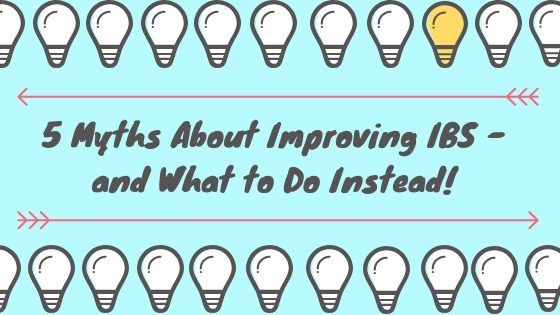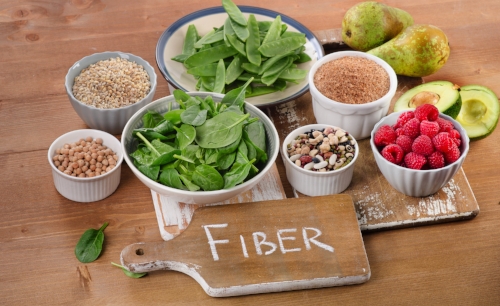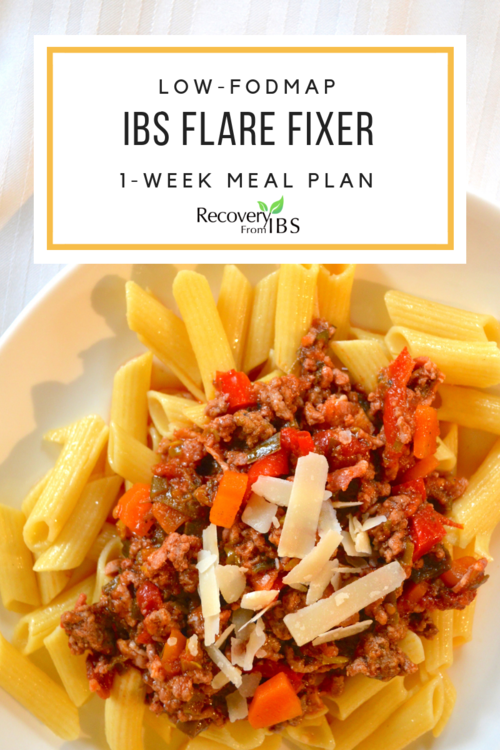5 Myths About How to Improve IBS – and What to Do Instead!

The frustration. One day, a specific lunch leaves you feeling great. The next day, same lunch, immediate rush to the toilet. What the….@&#%! The doctor hasn’t been much help with figuring this out, so off you go….scouring the internet for some answers for how to improve IBS.
Hmmmmm…..so much conflicting information. So many confusing protocols. Still no relief.
I get it. 90% of my clients have Irritable Bowel Syndrome (IBS) and it kills me to hear how difficult it is to get some tangible results. There are a lot of myths about how to improve IBS. These myths aren’t helpful, and they sometimes make symptoms even worse! So, let’s put these to bed right now.
Check them out below and, also, don’t miss my cheat sheet list of what to do for immediate improvement!
In this free handout, I share with you:
- The four most common FOOD TRIGGERS that most people with IBS aren’t aware of
- What IBS-friendly foods to eat instead
- The free, 10-minute habit that can dramatically reduce symptoms, and how it works
Grab it here, so that you can start banishing IBS symptoms today:
Ok, now onto these myths! I can’t wait to debunk these for you. Here we go…
Myth 1: An IBS Diet Should be High in Fiber
Let me tell you about Luke. He came to me for his IBS and here is a quote from him: “I keep trying to add more fiber from healthy fruits and vegetables to my diet. I may be crazy but it almost seems like healthy foods make it worse”.
Ugggghhhhh.
Such a common mistake. You’re not crazy, Luke. They are making it worse! Unfortunately, I often see this recommendation come from healthcare providers or from public health messages. Let’s get straight on something: certain types of fibers are the leading trigger of IBS symptoms! They might not be the underlying cause, but they certainly trigger the problem. So, ditch the idea that increasing fiber will help.
Now, it is true that fiber is important. It feeds your microbiome and helps to regulate bowel motility (think stool, the right texture at the right frequency).
So, what’s a person to do? Focus on low-FODMAP fiber, especially from fruits, vegetables, nuts, and seeds. Here are some examples of low FODMAP foods that will boost your fiber intake:
- Buckwheat flour
- Seeds: flax, chia, pumpkin, sunflower (max 2 Tbsp total)
- Nuts: macadamia, walnut, almond, pine, brazil, cashew, hazelnut (max 10 nuts)
- Popcorn
- Oatmeal
- Veggies: carrots, collard greens, kale, parsnip, pumpkin, spaghetti squash, summer squash
- Fruit: cantaloupe or honeydew (1/2 cup max), pineapple or grapes (1 cup max), 1 orange, 2 kiwis
This isn’t an all-inclusive list, but it’s definitely a start; focus on low-FODMAP foods with fiber. This will improve your IBS while nourishing your microbiome.

Myth 2: An IBS Diet is Super-Restrictive
Speaking of those problematic fibers, I have good news for you. Most people are more sensitive to some than to others. Most people can get great improvement of their IBS by removing ONLY A FEW WORST OFFENDERS. The trick is to use a systematic and tested approach to figuring out what those triggers are.
Unfortunately, I often see a less skilled approach cause major problems. For example, a woman named Janet came to me recently for help with her chronic IBS. She was convinced that diet couldn’t be the problem because she had already eliminated nearly everything from her diet – wheat/gluten, dairy, fruit, eggs, seafood, raw vegetables, and sugar. Yikes!
We added a lot back in, and then removed the most suspicious culprits that she was still eating. We experimented around those problematic fibers and BOOM – IBS recovery. Congrats, Janet!
Some foods that Janet was able to bring back without trouble were:
- Some types of dairy
- Eggs
- Seafood
- Sugar in small amounts
Janet couldn’t figure out what was triggering her symptoms, so she was playing guessing games trying to get some improvement. If you’ve tried this, you know…it’s NO fun and it doesn’t create a very healthy diet either. With the right approach, we found Janet’s true triggers so that she could achieve IBS remission while eating MORE foods than before.
So, remember – it’s not about removing tons of foods. It’s about using a smart approach to removing the correct foods.
Again, a low-FODMAP elimination diet is a smart place to start here. There is an initial phase that is the most restrictive (2-6 weeks), then foods are brought back in a systematic approach. Eventually, you end up with your best, most varied, and individualized diet.
The yield is: great results with no guessing games – for the win!
Myth 3: Eating for IBS is Overly-Complicated

I wish I had a dollar (or pound) for every time a new client said to me: “I keep looking up what to do and all of the conflicting information just seems overwhelming”. Yeah. The internet is a crazy place. What’s a guy or gal to do when your doctor can’t offer much more than a prescription, but the internet provides about 1,000,000 conflicting suggestions?
Get with a system and follow it. A low-FODMAP elimination diet is a great example of that. It’s a clear system for removing the food culprits that bother you the most, in a systematic way. Go with someone (or a resource) that is tested and experienced, so that you don’t run into confusing and conflicting lists.
It doesn’t have to be rocket science. I’ve led hundreds of people through elimination diets for IBS and they get great results without misinformation and confusion!
Myth 4: An IBS Diet Will Harm Your Gut Health
I totally get why people think this. Some initial research around IBS diets (especially the low-FODMAP diet) suggested that it may harm the diversity of beneficial bacteria in the colon (the microbiome).
However, newer and more advanced research has shown that this is NOT the case when the diet is followed properly. In the early research, patients stayed on the restrictive initial phase for too long and did not have enough professional support.
In the new research, patients advanced their diet with professional help, per their tolerance. They were able to achieve recommended amounts of fiber while maintaining phenomenal IBS remission rates – around 81%! (click here to see the study)
Another advantage of professional help is that it incorporates additional protective measures for the gut. For example, a qualified professional can help you find an appropriate and therapeutic probiotic. They can recommend supplements that support gut healing and restoration.
So, the risk to gut health really lies in the DIY approach – skipping around the internet and removing foods for long periods of time can definitely have detrimental effects on your microbiome and nutrient status.
On the other hand, getting help to implement a skilled approach can be a game changer. I routinely see people completely eliminate their IBS without any ill effect to their microbiome.
Myth 5: Just Stress Less

My pet peeve = hearing from my IBS patients that they’ve been told this. Yes, stress does affect the gut. However, not everyone has to run and find a toilet the minute they feel stressed. There’s much more to IBS than that, and new research has uncovered one of the primary things.
That thing is small-intestinal microbial overgrowth (SIBO). It turns out that around 70% of IBS patients have an overgrowth of bacteria in their small intestine. The bacteria sit there fermenting your food, producing gas, and causing all of the nasty bloating, pain, and bowel problems that you’re well-familiar with.
So, is reducing stress a good thing? YES. Will simply, ‘calming down’ or taking an anti-anxiety medication get rid of IBS? No – the key is to address the underlying causes such as SIBO!
Conclusion
The take-home message is that there is a dietary approach that can eliminate IBS symptoms in most cases. The trick is NOT to load up your diet with fiber, or to simply ‘stress less’. The right approach is not overly-restrictive, complicated, or harmful, but a systematic approach is essential. To get individualized guidance for how to improve IBS for YOU, seek out a trained professional who can help guide you to the quickest and most painless recovery!
Hopefully this cleared up some confusing myths for you about how to improve IBS.
If so, I’d like to share some SPECIFIC steps you can take to get some quick IBS improvement!
In this free resource, I share:
- The most common 4 food triggers
- What to eat instead
- A quick exercise you can do to shut down gas, bloating, abdominal pain, diarrhea, and constipation.
Bonus!
Don’t miss my FREE one-week ‘IBS Flare Fixer’ meal plan! It’s low-FODMAP, nutrient-dense, easy, and delicious!
It’s your ticket to try Low-FODMAP (done right) without having to figure it all out first.
It’ll have you feeling better inside of a week!
Warm wishes,
Erin Skinner, MS, RD, IFNCP, CPT, CLT
Integrative and Functional Registered Dietitian Nutritionist

P.S. Curious if we might be a good fit for improving your digestion? Contact me HERE to jump on a free chemistry call to discuss getting help for your IBS.


